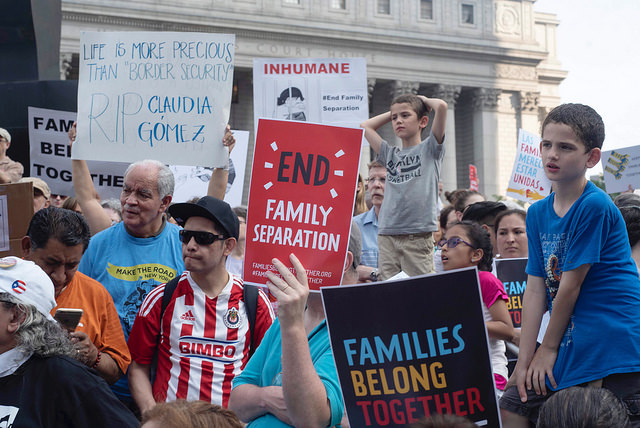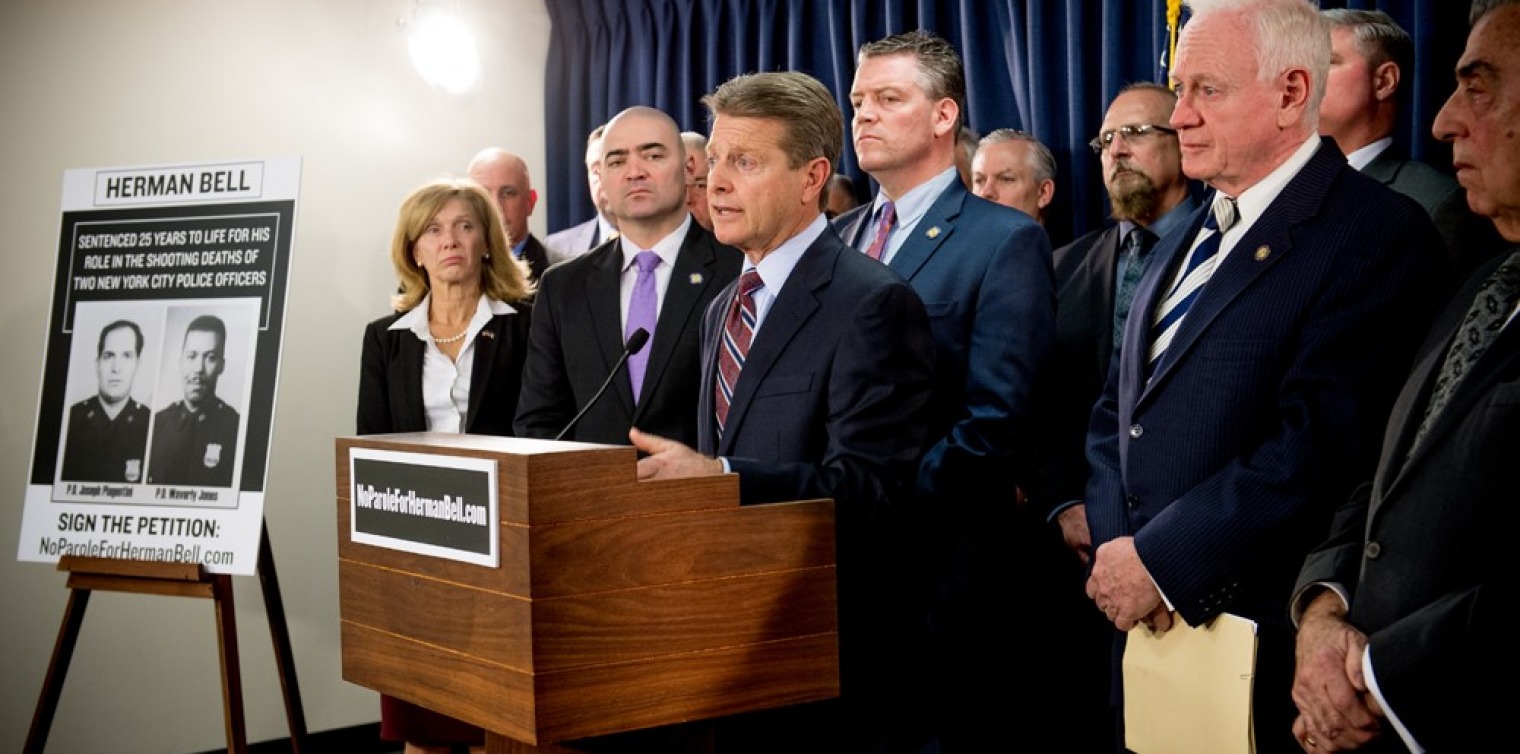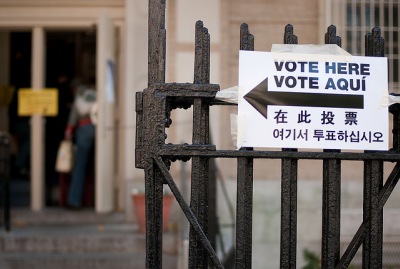Immigrant-Service Organizations, Struggling with Immense Demand, Need Our Support

(photo: John McCarten/New York City Council)
The news that immigrants who legally access public benefits, such as food, housing, and medical assistance, could be denied green cards will make it increasingly difficult for many immigrants across our city and nation to meet their basic needs, placing a sizeable burden on the nonprofit sector.
Already, the sector is faced with an unyielding demand for support by families and communities as immigrants turn to nonprofits for support in steeper numbers.
What has become abundantly clear from our work with more than 400 organizations each year that focus on immigration and other social service and advocacy groups is that the current challenges are formidable: nonprofits are doing the best they can despite a national climate of bias and discrimination against immigrants and the groups that serve them.
This increased workload is experienced not only by organizations with an immigrant-serving mission. It is seen by hundreds of the nonprofits we work with each year, from hunger organizations to affordable housing organizations, to those with an educational mission, and countless others.
Amid this climate, Community Resource Exchange recently convened six nonprofit leaders to illustrate the obstacles their staffs and constituents are facing. Speakers, whose work focuses on grassroots organizing, legal support, immigrant youth, economic justice, and LGBTQIA immigrant rights, pointed to issues that are creating a double-bind for nonprofits: increased demand coupled with changes to the system that make delivering services harder.
This the result of multiple factors, including that immigrants already have a heightened fear of being viewed as a public charge when accessing necessary services such as public assistance, Medicaid, and food stamps, for which they are eligible. The proposed change only exacerbates this fear.
This fear is the result of persistent myths that are being exaggerated in the current environment, for instance, that immigrants don’t pay taxes, come to the United States purely dreaming of opportunity (as opposed to fleeing life-threatening conditions in their homelands), and do not contribute to the economy, which have been proved untrue.
Complicating factors have been revisions to information required by the U.S. Citizenship and Immigration Services, amplifying fears of immediate deportation due to things like any accidental errors in completing applications.
Our panelists posed solutions to better serve immigrants: federal and international action to change the reality for immigrants in this country, including the need for a transnational conversation about the treatment of migrants and immigrants not just here in the U.S., but in Europe and other places. Local governments—city and state—and individuals must step in not only with financial help, but with common sense approaches.
Nonprofits need sufficient funding to support increased needs of immigrants coming through their doors, and elected officials who “get it” are those that are on the ground and in the neighborhoods, visibly witnessing the challenges being faced every day.
We must use our voices to seek change. This November 6, Election Day, is one opportunity, when people can support candidates who understand the needs and benefits of our multicultural society—and not just give lip service to secure votes.
Even simply starting a conversation with friends and family—albeit difficult ones—can springboard to broader awareness of the issues surrounding immigration, greater support for nonprofits on the frontlines of serving immigrants, and, most importantly, a better life for immigrants seeking a life in America free from discrimination and fear.
***
Katie Leonberger is the President and CEO of Community Resource Exchange. On Twitter @katieleonberger & @CREinNYC.
***
Have an op-ed idea or submission for Gotham Gazette? Email This email address is being protected from spambots. You need JavaScript enabled to view it.
Fear-mongering Versus Reality in New York Parole

Senate Republicans oppose Herman Bell's parole (photo via Senator Patrick Gallivan's website)
Juxtaposed with the decision by New York State Senate Republicans to hold hearings to voice anger over decisions by the Parole Board was this past Friday’s annual Parole Summit of the Lifers and Longtermers Organization at Otisville Correctional Facility.
Summit attendees, including parole reform advocates, clergy, academics, and a judge from the New York Court of Appeals, heard person after person talk passionately about the Lifers’ commitment to their “Four Rs” of responsibility, remorse, reconciliation, and rehabilitation. By day’s end it was clear that for many people behind bars there is a fifth “R” – redemption.
The transparent political motivation to hold hearings so close in time to elections is made all the more shameful by the appeal to fear-mongering, as comments already circulating by Senate Republicans raise the specter of droves of dangerous criminals randomly turned loose on the streets of Albany and Long Island, the chosen sites for the hearings, and elsewhere.
Senator Patrick Gallivan, Chair of the Crime Victims, Crime and Correction Committee that co-sponsored the hearings, characterizes a select few Board decisions granting parole as “indefensible and an affront to law-abiding citizens.” To the contrary, the Board followed the laws and regulations that govern the Board’s decision-making. Far more troubling to law-abiding citizens is an elected official urging the Board to flout the law.
The Legislature passes laws that set minimum and maximum sentences, and judges mete out sentences pursuant to those laws. A person becomes eligible for parole after they have served their minimum judicially-imposed sentence. The Legislature has enumerated a number of factors that the Parole Board must consider when weighing whether to grant parole. If you have done well while incarcerated -- completed all required programs, avoided serious disciplinary infractions, accepted responsibility for your actions, and made a thorough re-entry plan -- you should be released. That is the law. Indeed, that is what people are told when they are sentenced.
Long-overdue changes to the laws and regulations that govern parole direct the Board to take a forward-looking approach; evaluate who the person is today instead of fixating on the crime of conviction from often decades earlier. Now, the Board is required to utilize an objective evidence-based risk-assessment tool to determine whether someone presents a risk of future violent behavior. Elected officials who suggest that the Parole Board is turning loose a slew of dangerous criminals conveniently ignore that each of these people were deemed to be at the lowest possible risk for re-offending. They also elide the fact that each of these people served decades in prison before they were released. Not only have they been significantly punished, but, according to every study of age and crime, they have long ago “aged out” of any real possibility of future criminal conduct. Put simply, they are profoundly different people at age 50, 60 or 70 than they were when they were in their teens or twenties.
Several Senators also refer disingenuously to the Board’s “seeming automatic releases.” That is patently untrue. The most controversial cases of the past year all involve people who had been denied parole eight, nine, ten, or more times spanning decades. However, consider the recent case of Richard DiGuglielmo. Mr. DiGuglielmo was convicted of murder and sentenced to 20 years to life in a high-profile case involving the killing of a black man by a white off-duty police officer in a dispute over a parking space. Mr. DiGuglielmo served his 20-year minimum and was released at his very first appearance before the Board, a very rare outcome for someone convicted of murder, especially considering the objections from the victim’s family. Notably, there was no outcry from the Republicans members of the Crime Victims, Crime and Correction Committee.
The Board is subjected to relatively little public opprobrium when it chooses to deny parole. Contrary to the claims of Senate Republicans, the far larger problem with the Board, as made abundantly clear at the Otisville Parole Summit, is its habit of routinely denying parole to the many people who have so fully transformed, decisions based solely on the serious nature of the crime of conviction, something the person can never change. These punitive, backward-looking decisions ignore the innate human capacity to change and are ultimately cold and merciless.
The epidemic of mass incarceration is now readily acknowledged. The 130 Lifers and Longtermers at the Otisville Summit have collectively served more than 2,400 years in prison. Many of them have been denied parole repeatedly based exclusively on the crime of conviction from decades before. Contrary to the views of Republican members of the Crime Victims, Crime and Correction Committee, decisions grounded in the extant laws and regulations to grant parole should be praised, not pilloried, and must not be influenced, let alone determined, by who yells the loudest.
***
Steven Zeidman is a professor of law at CUNY School of Law. On Twitter @SteveZeidman.
***
Have an op-ed idea or submission for Gotham Gazette? Email This email address is being protected from spambots. You need JavaScript enabled to view it.
Closing the Door on Foreign Money in New York City Elections

How far and how deep did the Russian government and Russian nationals go to influence United States elections? While hacking and manipulation of social media have garnered significant attention from both the media and the Mueller investigation, it’s also clear that Russian money was being funneled through some surprising channels, such as the National Rifle Association (NRA).
When Citizens United opened the floodgates for corporations to spend unlimited amounts in our elections, it also blasted open a loophole for foreign money to be used to influence U.S. elections. Earlier this month, we collaborated to introduce a bill to close that loophole and keep foreign money out of New York City elections.
While current federal law—affirmed by the Supreme Court in 2012—prohibits foreign governments, foreign-based companies, and people who are not U.S. citizens or permanent residents from contributing or spending money in connection with any federal, state, or local elections, after Citizens United, foreign entities can still invest money through U.S.-based corporations that can then spend as much money as they want on American elections. That’s a direct threat to democracy, and one that our federal government has yet to remedy.
This is not a hypothetical. Companies that we consider to be “American” often have significant foreign investment, and at times that investment comes from some questionable sources. DST Global, for example, has gained notoriety for its Russian connections and has significant investment in many U.S. tech companies, including several iconic companies like Airbnb, Facebook, and Twitter. Saudi Arabia has also been “using its wealth for global influence” with over $2 trillion to invest via its sovereign wealth fund, and it has already taken large stakes in U.S. based companies like Uber, Tesla, and Sprint through its joint tech fund with SoftBank Group, a Japanese company. To be clear, we do not mean to say that these companies are controlled by Russia or Saudi Arabia, but they do serve as examples of how little we know about the foreign ownership of American companies, some of which spend significant amounts trying to influence American politics.
As the U.S. midterm elections approach, foreign actors are testing out new ways to hide their trails. They’ve stopped paying in rubles, and that means that the corporate loophole created by Citizens United will be ever more attractive. The evidence is also mounting that Russia was not alone. Saudi Arabia, the United Arab Emirates, Qatar, and others reportedly sought to put their thumbs on the scale. Though Ellen Weintraub, the vice chair of the Federal Election Commission, has been sounding the alarm about this for years, partisan politics has stopped attempts in Congress and at the Commission to prevent foreign money from being funneled through corporations.
That’s why it is critical to move now to protect our local elections from corrupt foreign influence and to help create a national model for campaign finance reform. In order to protect the integrity of New York City elections, our bill -- Intro. 7087 -- would strengthen the existing federal prohibition on direct foreign and corporate campaign contributions by extending the ban to American corporations under substantial foreign ownership or control.
The bill would prohibit contributions and spending in local elections by “foreign-influenced entities,” which is defined as an entity that is either (1) more than 5 percent owned by a single foreign national, (2) more than 20 percent owned by more than one foreign national, or (3) a corporation in which foreign-national owners call the shots on its political activities. A similar proposal enacted in St. Petersburg, Florida received the backing of constitutional luminaries like Laurence Tribe and Charles Fried, and stands on firm legal ground.
New York has long been a leader in taking action to protect the integrity of its elections and ensure that the voices of New Yorkers are not drowned out by corporate money. New Yorkers deserve to know that foreign money is not flowing into local elections through hard-to-trace corporate channels. This bill upholds the basic principles of American self-government, free from foreign influence. Foreign interference is a clear and present danger, but by closing this gaping loophole New Yorkers can stem the flow of foreign money in their own elections and lead the way for the rest of the nation.
***
Public Advocate Letitia James
John Bonifaz, President, Free Speech For People
Shanna Cleveland, Senior Counsel, Free Speech For People
***
Have an op-ed idea or submission for Gotham Gazette? Email This email address is being protected from spambots. You need JavaScript enabled to view it.




